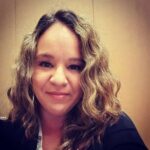Volume 37 Number 1 | February 2023
Emilia Marrero-Greene, MEd, MT(AAB), M(ASCP), ASCLS-Florida President, ASCLS Diversity Advocacy Council Secretary

The conversation around this topic during the panel was engaging and eye-opening, and in light of ever-changing political and workforce matters, deserves additional focus. Despite what we may experience in our individual workplaces, statistics show a persistent lack of diversity among healthcare professionals. Black, Hispanic, and Native American populations are severely underrepresented compared to the general population. Diversity in the laboratory and within our Society continues to be a prime focus for ASCLS. Including the topic of the languages we speak in our critical conversations about diversity may shine a light on how we can improve efforts to ensure a more diverse workforce.
My personal interest in this subject stems from my experiences as a second-generation Puerto Rican born in a housing project in New York City and raised in Central Florida’s changing social landscape. My early upbringing exposed me to a variety of languages and cultures. Walk down any street in New York City, and you are likely to hear and experience three or four languages in the span of five minutes. My mother tried to raise me as bilingual, believing that it would make me a better candidate for employment in the long run. She was bilingual, and speaking fluent English and Spanish was an asset in her career as a nurse.
“A multitude of cultures is embedded in the fabric of this country, and we need our Spanish, Tagalog, and French-speaking comrades to communicate with our elderly population and for outreach work in public health.”
In 1988, my mother purchased a house in Poinciana, Florida, a brand-new community located an hour from Orlando. This new housing development was being advertised to middle class families in metro areas like New York and Boston, as well as in Puerto Rico and other Caribbean countries. Upon arriving in Florida, I soon learned that the deep south was quite different from the city. While the demographics of Central Florida would change drastically in the mid-to-late 1990s, during my initial time there in the late 1980s I certainly felt like my family was alone in our diversity. To make matters more challenging, we were bussed to a rural area of the county for school.
At the time, Polk County was known for growing citrus, and the diversity in the county came from migrant farm workers from Mexico. The kids I went to school with either spoke only English or only Spanish, and the Spanish speakers struggled with fitting in. I remember some teachers being not so nurturing in telling the children, “In this country, we speak English. You need to learn English.” In an effort to fit in and not feel ostracized as the only Puerto Rican in my third (and fourth) grade class, I stopped practicing Spanish entirely.
The cultural landscape in Florida did eventually expand as folks from all over the United States and Caribbean Islands flocked to take advantage of better job opportunities and warmer weather. Despite—or perhaps because of—this cultural expansion, I still often witness disparities when it comes to language. Before beginning my career as a lab scientist, I worked in veterinary medicine for many years, and I distinctly remember the resentment of fellow veterinary assistants over Spanish-speaking clients that required translators.
Early on in my career as a lab scientist, I would regularly receive communications forbidding speaking anything but English when working at the bench. At this point in my life, I was fully embracing my heritage and attempting to hold conversations in my broken “Spanglish.” However, we were told that even when we were having casual conversations with our co-workers, we were being offensive to the English-only speakers in the lab. I cringe when I remember reading stories in 2016 of Latinos being approached in lines at grocery stores or in restaurants and being told, “This is America. Speak English!”
Fortunately, I now work for an organization that embraces diversity and doesn’t make policies forbidding the use of one’s native language. That’s not to say that some resentment within our profession doesn’t exist. We fully understand the need for multilingual healthcare workers. A multitude of cultures is embedded in the fabric of this country, and we need our Spanish, Tagalog, and French-speaking comrades to communicate with our elderly population and for outreach work in public health. We would never imagine being resentful to the patients we have committed to our care. Why aren’t we as compassionate with each other in the lab? Why does it bother some to hear casual conversations in Tagalog, or to see one individual training another in Spanish?
Unfortunately, those are questions I cannot personally answer. What I can do is set an example of acceptance and show belief that my coworkers are speaking with love in their hearts. I know that we must have a universal language within the lab and that the majority of healthcare workers speak English primarily. Of course, we must all be able to communicate in order to do our jobs. But it’s frankly none of my business if Sally trains Betty in French Creole, as long as Betty can perform the test safely and competently. It’s also none of my business if John and Carla want to discuss their weekend plans in Chinese. If I want to communicate with any of my fellow laboratorians in their language, I will ask for the words to use. I see it as an opportunity to further share our cultures, as we do with food and celebrations. However, when it comes to our patients and the work we do to care for them, the only required language is love.
Emilia Marrero-Greene is the Microbiology Supervisor at Lakeland Regional Health in Lakeland, Florida.